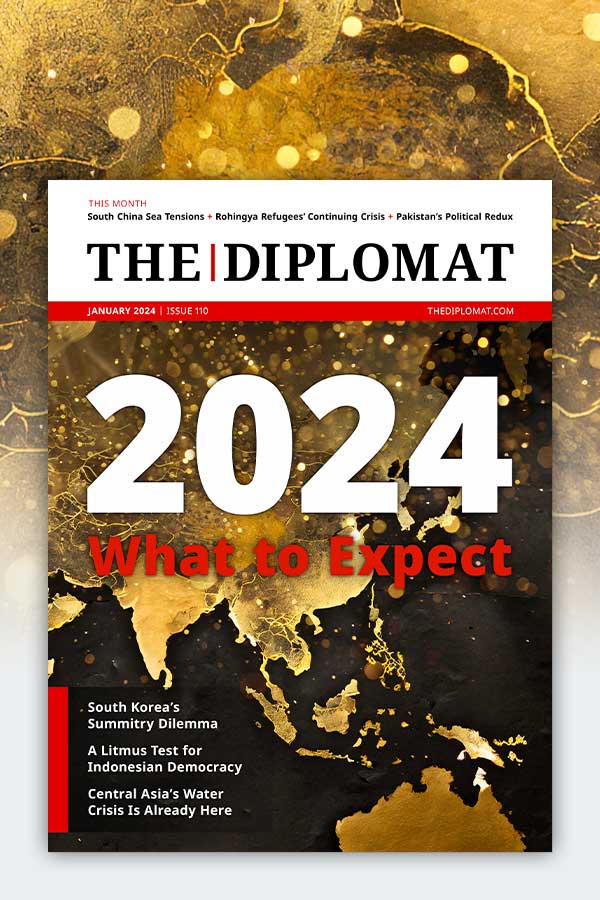| Welcome to the latest issue of Diplomat Brief. This week our top story explores how Chinese strategists conceive of a concept central to military planning: deterrence. We also have an interview with Rajeev Bhattacharyya, a veteran journalist based in India’s Northeast, about the new agreement between India and the Assam separatist group ULFA. |
| Story of the week | ![[object Object]](https://thediplomat.com/diplomat-brief/2024/vol02/images/feature.jpg?v=1) | Security Understanding China’s Approach to DeterrenceWhat Happened: The age-old concept of deterrence has gained new primacy as great power competition returns to the fore – and the potential for nuclear weapons use grows. With China as the world’s rising military power, its unique understanding of deterrence is shaping how the People’s Liberation Army pursues warfare. But there’s currently not much focus on the important ways the Chinese definition of deterrence differs from the American counterpart. Our Focus: Dr. Michael Clarke, a senior lecturer in Strategic Studies at the Centre for Future Defence and National Security, Deakin University, outlines the role of deterrence in Chinese military strategy. To start, he notes that “deterrence,” in the Western sense is primarily about preventing a military action; in Chinese, the concept encompasses both deterrence and “compellence” – forcing an adversary to act in a specific way. “Therefore,” Clarke explains, in Chinese military strategy documents “deterrence is conceived of not as a static activity, but one that has phases of application across peacetime, crisis, and war.” That’s the “why”; equally important is the way China conceives of the “how” of deterrence. China’s military planners show a strong tendency toward “escalate to de-escalate” tactics as a form of deterrence, coupled with an high level of confidence in their ability to control the intensity of a conflict (known as “war control”). What Comes Next: China’s notions of deterrence/compellence and “war control” have obvious implications for Taiwan, as they are already informing Chinese military strategy in the Taiwan Strait. But in that example, China seems to have forgotten a key part of deterrence: the target actor must believe that conceding will be less harmful than resisting. In Taiwan’s case, where concession means annexation by an authoritarian government, that’s a difficult case to make. As Clarke notes, “China’s current behavior amply demonstrates to Taiwan that it will suffer regardless of whether it resists or concedes to Beijing’s coercion, thus arguably increasing Taiwan’s resolve to resist.” Read this story |
| Behind the News | INTERVIEW Rajeev BhattacharyyaRajeev Bhattacharyya, a veteran journalist based in India’s Northeast and author of “ULFA:The Mirage of Dawn,” on the potential for true peace in Assam: “This accord is with the pro-talks faction of ULFA. The anti-talks faction led by Baruah, which has camps in Myanmar, is still engaged in the campaign for securing Assam’s independence. It is severely weakened but still has the capacity to carry out violent attacks.” Read the interview |
| This Week in Asia | Northeast Asia Taiwan VotesSaturday, January 13, will see the election of a new president in Taiwan, along with a new legislature. Together, they will determine the country’s future for the next four years. It’s been a typically contentious race, with the different cross-strait policies of the candidates (and China’s own obvious preference) attracting particular attention. Now it’s time for voters to make the final decision between William Lai of the ruling DPP, Hou Yu-ih of the KMT, and Ko Wen-je of the TPP. And don’t sleep on the legislative race either; current polls indicate that a split executive/legislative branch in Taiwan is a very real possibility. Find out more | South Asia The India-Maldives War of WordsA social media tiff has spiraled into a diplomatic incident between India and the Maldives. What started as typical trollish name-calling on social media over the best tourist destination in the Indian Ocean escalated when deputy ministers from the Maldives got involved in the insults. Ambassadors have been summoned and complaints issued at the official level. The snowballing spat is a window into how fraught India-Maldives relations have become under new Maldivian President Mohamed Muizzu. Find out more | Southeast Asia Myanmar Rebels Break Through in the NortheastMyanmar’s military junta is reeling after the Myanmar National Democratic Alliance Army (MNDAA) completed its reconquest of the Kokang Self-Administered Zone in the northern part of Shan State. The fall of Laukkai, the zone’s capital, saw the reported surrender of 2,389 soldiers, including six brigadier generals, the largest in the history of Myanmar’s armed forces. The soldiers were subsequently allowed to withdraw to Lashio, some 186 kilometers to the southwest, after turning in most of their weapons. The defeat not only returns the MNDAA to power in Kokang, from which it was driven by the military in 2009; it also marks the most serious setback for the military since the coup of February 2021. Find out more | Central Asia Latest Russian Neo-imperialist Trash Talk Sparks Outrage in UzbekistanNot for the first time, a Russian commentator sparked outrage recently in Central Asia with neo-imperialist trash talk. Zakhar Prilepin, a notable Russian public figure, suggested during a late December press conference that territories – like Uzbekistan – from which millions migrate to Russia for work ought to be annexed. The comments sparked a backlash that went all the way to the top, with the Russian ambassador in Tashkent summoned and even President Mirziyoyev seeming to weigh in with opaque comments most took as a response to Prilepin. Find out more |
| Visualizing APAC |  | Source: Trademap.org Central Asian imports from China surged to record highs in 2022 – the same time that Central Asian exports to Russia, under severe new sanctions, experienced a suspiciously similar leap. See the full picture |
| Word of the Week | Society 경단녀Gyeong-dan-nyeo: Korean for “career-interrupted women,” referring to women forced out of the workforce at least temporarily after having children. Find out more |
|  |
![[object Object]](https://thediplomat.com/diplomat-brief/2024/vol02/images/feature.jpg?v=1)

